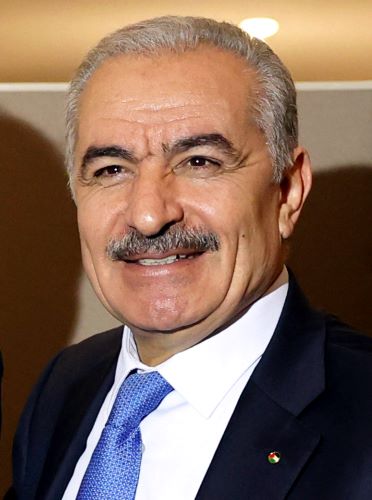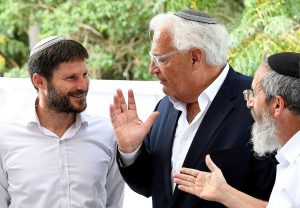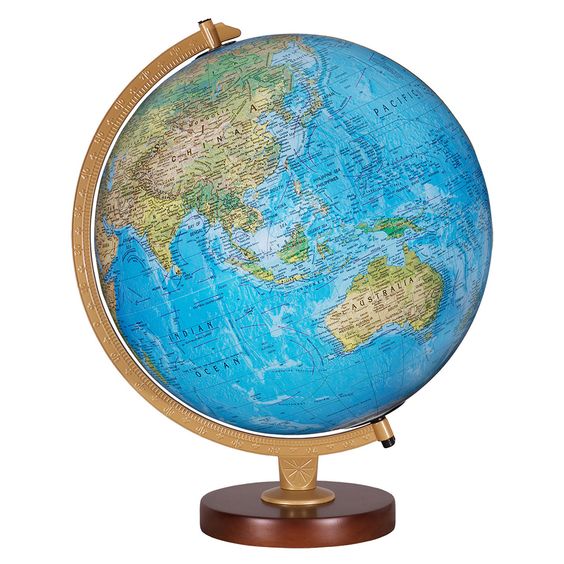
The best hope for peace would be if Netanyahu is ousted from power and Trump is blocked from returning to the White House
By Tom Arms
Finally, there appears to be a glimmer of progress on the Gaza front.
In the unlikely venue of a New York ice cream parlor, President Joe Biden, revealed this week that he is hopeful for a ceasefire by Monday.
And almost simultaneously, Muhammad Shtayyeh, prime minister of the Palestinian Authority, resigned to make way for a reorganized government for the West Bank and Gaza Strip which could provide an outside chance of leading to recognition of a State of Palestine.

The departure of Shtayyeh comes amidst a flurry of diplomatic meetings involving American, British, EU, and Arab state officials in Riyadh, Paris and Doha.
What appears to be emerging is an agreement for a “temporary” ceasefire of “some weeks” which would involve the release of all the remaining Israeli hostages; the freeing of an unspecified number of Palestinian prisoners and a massive influx of humanitarian aid into Gaza.
That appears to be the bones of a short-term agreement. The long-term is more problematic because it involves a revival of the two-state solution and recognition of a reconstituted Palestinian Authority as a Palestinian state.
The idea was mooted back in January by British Foreign Secretary Lord Cameron as part of a carrot and stick approach that involved British support for Israel as the flip side of the diplomatic coin.
Recognition would be accompanied by Arab and American-backed security guarantees for Israel and the prospect of the normalization of relations between Saudi Arabia and Israel. To encourage the Palestinians to compromise, there would be a multi-billion dollar fund to rebuild Gaza and provide an investment fund for the Palestinian Authority. Neither Israel nor Hamas would be allowed to remain in power in Gaza.
The giant human fly in this political ointment is Israeli Prime Minister Benjamin Netanyahu. He has said that the southern Gaza ground offensive planned for 10 March “could be delayed somewhat.” But, it would be for “a week” rather than “weeks” and would not be allowed to stand in the way of “total victory.”

As for the proposed long-term solution of a two-state solution, diplomatic recognition and all its diplomatic trappings; that is a “non-starter.” Instead, the Israeli Prime Minister plans to retain control of Gaza and any rebuilding plans would be contingent on the demilitarization of the 25-mile-long strip of Middle Eastern real estate.
Donald Trump could be another potential problem. He has gone on record as rejecting the two-state solution. But that was while he was in the White House. Since 7 October his Middle Eastern pronouncements have been restricted to the decidedly unhelpful suggestion that the two sides should be left “to fight it out.”
His former ambassador to Israel, David Friedman, however, has been more succinct. “Make no mistake,” he said, “recognition of a Palestinian state would be even more devastating to Israel than the attack on the 7th of October.”
It would seem that the best hope for peace would be if Netanyahu is ousted from power and Trump is blocked from returning to the White House.
 World Review
World Review
French President Emmanuel Macron set the cat among the NATO pigeons this week when he hinted that France just might—no stronger than might at this stage—send troops to Ukraine.
The suggestion was definitely on the table when 21 Western heads of state or government and six foreign ministers met in Paris this week. Polish President Andresz Duda confirmed it.
It was apparently raised by Macron and we know that the frontline Baltic states of Estonia and Lithuania backed it. We also know that the British, American and Germans vetoed it—for the time being. Everyone else is keeping their cards close to their chests.
On two things the allies were agreed: Russia is stepping up its cyber and disinformation attacks and that sometime in the next few years, according to Macron, “we have to be prepared for Russia to attack the (NATO) countries.”
Immediately following the Paris summit, President Vladimir Putin delivered his annual state of the nation address in which he warned that any further NATO involvement in Ukraine “raises the real threat of a nuclear conflict that will mean the destruction of our civilization.”
On a slightly less apocalyptic note, Putin said that he would be strengthening Russian forces on its Western flank which means recently annexed Eastern Ukraine, the Russian enclave of Kaliningrad and the Russian borders with the Baltic States and new NATO member Finland.
Ideally, NATO would avoid a head to head with Russia by providing Ukraine with the means to keep fighting. But Europe’s defense industries lack the capacity and America’s $60 billion military aid package is being blocked by MAGA Republicans.
One solution was voiced this week by European Commission President Ursula von der Leyen. She suggested using the $300 billion in frozen Russian assets to purchase weapons for Ukraine. The money had been earmarked for reconstruction purposes. But if Ukraine is defeated than there will be nothing to reconstruct.
***
Meanwhile, as of this writing, martyred Russian Opposition leader Alexei Navalny is being laid to rest in Moscow’s Borisovskoye Cemetery.
The funeral service was held in a Russian Orthodox Church near the Navalny home in southeast Moscow. A large crowd gathered outside the Church of the Icon of the Mother of God. As Navalny’s body was carried in and out of the church the crowd chanted “Navalny, Navalny” interspersed with “executioners, “executioners”
The church was surrounded by masked police guards who blocked several of Navalny’s closest allies still in Russia from entering the church. They also banned cameras and videos from the church, although Navalny’s supporters were able to broadcast much of the event on a You Tube channel which was watched by hundreds of thousands.
The state media did not report the funeral and the Kremlin, when asked to express condolences, refused to do so.
Navalny’s death is the most high profile and dramatic anti-dissident action by the Putin regime. But it is not the only one. This week 70-year-old Russian human rights activist Oleg Orlov was sentenced to two and a half years for criticizing the Russian invasion of Ukraine.
Orlov is best known as the co-chair of Memorial, a Russian human rights organization which was one of three winners of the 2020 Nobel Peace Prize. In October he was fined $1,600 for an article in which the state said he “discredited” the army. Not enough, decreed Putin. So the verdict and sentenced were cancelled and Orlov was this week placed on trial for the same crime and this time sent to prison.
Orlov and Navalny are only two of thousands of Russians who have dared to criticize Putin. Most of them have either joined Navalny in the grave or Orlov in prison.
***
Islam is the new scapegoat of Europe. Actually, that is not accurate, fear of Islamisation has been around since before the Battle of Tours in 732.
But it appears to have reached a fresh apogee in Britain. And the rest of Europe’s far-right parties are no slouches in the Islamaphobic stakes.
Viktor Orban in Hungary, Marine Le Pen in France, Gert Wilders in the Netherlands, the Swedish Democrats in Sweden…. They have all helped to move the anti-Islam dial and, in doing so, have infected the mainstream political parties.
In Britain it stayed on the distant fringes of the far-right for a long time. Parties such as the British National Party and English Defense League were associated with football hooliganism as much as Islamaphobia.
That started to change with the rise of UKIP and its successor party Reform. They have been gradually chipping away at the right-wing of the Conservative party with the result that the Tories have started to steal some of their anti-Islamic clothes in order to keep their voters.
This became all too apparent this week when Conservative Party Chairman Lee Anderson told the right-wing news channel GB News that the Muslim Mayor of London, Sadiq Khan was controlled by Islamists and that he had given the city away “to his mates.”
For working purposes, the term “Islamists” is generally interpreted as either Islamic extremists or Islamic fundamentalists. I personally know Sadiq Khan. Before I joined Liberal Democrats I had a brief flirtation with the Labor Party and deputized for Sadiq on two occasions when he was my constituency MP. He is almost as far from being an Islamic extremist as the Pope.
Which might partly explain why Lee Anderson’s comments led Rishi Sunak to belatedly withdraw the conservative whip from him. But the prime minister, has refused to condemn Anderson’s remarks.
His former Home Secretary, Suella Braverman, has gone even further. Writing in The Daily Telegraph, she said: Britain is sleepwalking into a ghettoized society where Sharia law, the Islamist mob and anti-Semites take over communities”
Why has Ms. Braverman not suffered the same fate as Mr. Anderson? Because Mr Sunak needs her to hold his crumbling Conservative Party together.
The far-right anti-Islamic party Reform says Anderson and Braverman should jump ship join them. Not a chance. They are sticking with the Tories because when they lose the next election—as they almost certainly will—the party is expected to lurch even further to the right. When that happens Ms. Braverman will make her bid for the party leadership. Lee Anderson will doubtless be offered a plum post in the Shadow cabinet.
***
The US Supreme Court has never been apolitical. It is supposed to be. The founding fathers organized lifetime appointments to lift the court above what James Madison called “the tumult and conflict of the political process.”
It didn’t work. Justices appointed by liberal-minded presidents have tended towards liberal judgments and those appointed by conservative presidents have gone the other way.
Trump managed to appoint three justices. This gave the court a 6-3 conservative slant which led to the return of anti-abortion laws and several other conservative judgments.
But a decision this week takes the court into uncharted and choppy waters. The US Supreme Court agreed to hear the case about whether or not Donald Trump has blanket immunity from criminal prosecution. They have not decided the case. That won’t come until probably the early summer.
But the court’s decision to hear the case is a win for Trump because it makes that much more unlikely that he will come to trial before the November election.
The court’s decision to hear the case puts the Justices in a difficult position. If they rule for Trump then they alienate the half of the country that hate him. If they rule against him they incur the wrath of his MAGA base.
They could have avoided this dilemma. They had the perfect out. The DC court that heard Trump’s appeal issued what a number of jurists considered a watertight 3-0 judgment. Rejecting his immunity claims, the court ruled that if they had decided otherwise then Trump—and by extension, his successors—would have “unbounded authority to commit crimes that would neutralize the most fundamental check on executive power—the recognition and implementation of election results.”
Trump and his lawyers argued differently. As the ex-president wrote on Truth Social: “Without presidential immunity, a president will not be able to properly function or make decisions in the best interests of the United States. Presidents will always be concerned, and even paralyzed, by the prospect of wrongful prosecution and retaliation after they leave office. This could actually lead to the extortion and blackmail of a president.”
It sounds like a strong argument. But should the immunity extend to the protection of the political interests of an individual president? Prosecutor Jack Smith has charged Trump with attempting to defraud the United States with false Electoral College voters and blocking the congressional certification of Joe Biden’s election victory.
Has the interests of the office of the President of the United States become totally conflated with the interests of the individual who occupies it?
__________________
 Tom Arms is foreign editor of Liberal Democrat Voice and the author of “America Made in Britain” and “The Encyclopedia of the Cold War.” He is also co-host of the world affairs podcast “TransAtlantic Riff” which can be heard by clicking here
Tom Arms is foreign editor of Liberal Democrat Voice and the author of “America Made in Britain” and “The Encyclopedia of the Cold War.” He is also co-host of the world affairs podcast “TransAtlantic Riff” which can be heard by clicking here
[…] Read: Observations of an Expat: Middle East Movement […]